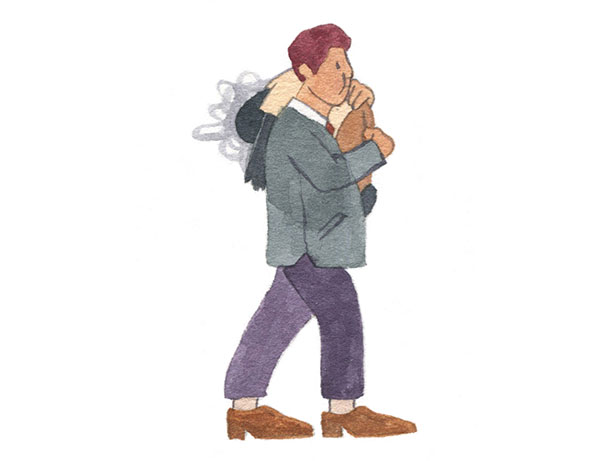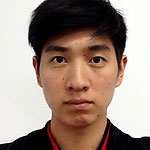
I graduated high school with over 30 unexcused absences from classes — each red mark an indictment on a day that I physically couldn't bring myself to get out of bed.
Social workers and psychologists I spoke with used the clinical term "depression" to describe what I was experiencing. All I knew was that whenever I was conscious, I wanted to not exist. By the end of my senior year, I had lost my 3.8 GPA and barely received my diploma, graduating with a 1.6.
Weeks became months and my body felt constantly tired, no matter how much sleep I got. I didn't know what was happening to my body or my mind. My mom talked about medication and my altered brain chemistry. My dad diagnosed my wounded soul, asking me if I was praying and reading the Bible regularly.
Looking for ways to disappear, sleep became my drug. I just wanted to fade back into haze and mist, and I knew that nobody would miss me if I just evaporated. When I woke up each day sobbing, I would force myself back to sleep against the morning light and every instinct that said to rise. Every day I was going through the motions of a regular human, but totally dulled to life.
My unspoken prayer became: "God, why did you let me wake up today? I don't want to die, I just don't want to exist. Help me return to nothing."
I used to think that depression was just a general state of feeling mopey, something you could shrug off like a mild cold. But depression is not just feeling "kind of sad". That's just sadness — depression is something else entirely. And before I could even cry out for help, I had slipped under the surface, paralyzed.
To my surprise, I found that my kind of sadness broke the rules of time itself. Not only was I feeling unhappy now — but my happy memories suddenly felt utterly void of joy as well. It was as if the color had been drained from all former stills of vibrant life — every cheerful gallery depleted of color, left starchy by the rot that depression festered in my mind.
Not only was a happy past inaccessible, not only was the present pointless, but my mind whispered that without a doubt, my future would bring only pain. I could only picture more decay, hostility, and hopelessness. I couldn't receive joy from any point in my life's timeline, which had been colonized under this rule of bleakness.
Past, present, and future spirited away from any gleam of hope: Christ has not died for us, Christ is not risen, Christ will not come again.
• • •
The French German theologian Albert Schweitzer often wrote beautifully of his humanitarian work in Africa, which he viewed as a kind of personal atonement for the ongoing sins of his country's colonialism in the region. In the spring of 1909, Schweitzer delivered a sermon to his church in Strasbourg reflecting on a "sleeping sickness" he had seen among locals he worked with while abroad.

This affliction, he explained, first saw its victims become only slightly tired. Gradually, the disease would intensify until the affected person lay asleep constantly. Without proper treatment, the infected eventually passed from sheer exhaustion into coma and death.
Constructing theological meaning from this infection, Schweitzer suggested to his congregation that among them existed "a sleeping sickness of the soul"; its "most dangerous aspect is that one is unaware of its coming." Schweitzer warned: "You have to be careful. As soon as you notice the slightest sign of indifference, the moment you become aware of the loss of a certain ... longing, of enthusiasm and zest [for life], take it as a warning ... your soul has suffered harm."
The sleeping sickness of the soul is an old companion of mine, if not family. I became unable to feel joy from things I loved doing, and unable to receive care from a family that I knew loved me.
Years later, as my grandmother was dying, long-hidden family stories began to surface. My mother shared with me that the first time she met her future mother-in-law was when my grandmother had been hospitalized for depression — a condition that would claim her life. At the time, my father explained that my grandmother had "a heart problem", which was only poetically true.
Whenever we visited, my grandmother couldn't leave her bedroom. She would cry, "It hurts, my body hurts. Just leave me alone." My sisters and I would lie next to her in her bed as she sobbed and told us that she just couldn't get up. The last time I saw her awake, we wheeled her around a park on a sunny, breezy Chicago day. There was no life in her face, no response to our jokes or smiling invitations. I saw in her a chilling reflection of what had once haunted me. The sleeping sickness, a good and faithful servant, had dutifully done its work.
We held my grandmother's funeral in a Chinese Baptist church, with a gargantuan white Jesus statue looming over its sanctuary. Grandma, a child of Buddhist, Big Island plantation culture, had hardly been to church more than a day in her life. Meanwhile, I had been raised dutifully American, in Roman Catholic and evangelical churches — among crucifixes and confetti cannons, "glory-be"s and electric guitars.
I always knew that God was real. But the church's stories of glory and grace, resurrection and hope began to mean very little to me as I lost the ability to experience lasting wonder. It would have been unimaginable for me to name — at youth group, to my priest, or pastor — the slow corruption that gripped my flesh. In church, I worshipped God with smiles and hands held high, papering over wounds and sliding on masks so I wouldn't bum everybody else out.
Where was God in those days, when my sickness nearly claimed me entirely?
At a worship night that my youth group leader brought me to in Willow Creek Community Church's evangelical megachurch auditorium, I heard how God was our majestic Creator, tangled up in the glory of distant stars and galaxies. At mass, among incense and candles, the priest said that God was as close as the recesses of our minds and the curves of our hearts.
But how could God be alive in my body and mind if God's temple was wounded and chemically altered by medication? How was the image of a distant God supposed to warm me any more than cold, vaulted cathedral ceilings, or the sprawling lattices of industrial beams holding up our former warehouse-turned-megachurch?
Bible scholar Frank Yamada says that when the church doesn't create spaces for lament, people will do it in the streets. I've seen this happen in my hometown of Chicago and elsewhere: prayer vigils, secular liturgies of labor and love, anti-violence and deportation rallies, public protests — each a precious split in the fabric of "normalcy", where we can come together to name our loss and bleeding as fellow human beings.
These expressions of public grief are most crucial to those beaten down under the cruel indignities of daily oppression, whose bodies are crucified by illness or lasting malady, and those most viscerally affected by national tragedies like mass shootings, non-indictments, and amassing election wins for white supremacist interests.
Can we jettison our commitment to cheap joy and craft spaces for authentic public lament as a church? Might our liturgical traditions of silence and mystery in worship speak life to those whose souls are being pierced by loss and grief? Can we help hurting people — to replace desperate supplications to return to nothing with a calling to become something — together?
I am in a much more grounded place now than I was five years ago, and I healthily transitioned off medication several years ago. But tucked away somewhere deep and dank, I know that I could at any time be swallowed into oblivion again. I maintain support systems, but I also know that there is no once-and-for-all salvation from all forms of depression. Even the curtailing light hours of daylight saving time have the potential to call me back to some familiar precipice. I don't know if I'll ever feel so trapped again, but I pray I do not.
What I do know is that healing from my sleeping sickness could only ever happen in community. Whenever I wake and feel those old stirrings of solitude cursing hope and saying I shouldn't exist, I need the people of God to summon me and insist otherwise. I need to hear new testaments from loved ones experiencing life around me. I need to engage in ancient rituals designed to celebrate and remember the one who knew no sickness, but whose body became sick in solidarity with us. I need you to be willing to weep with me, to honestly see and hold my emptiness without trying to stuff it full of glitter and cheer.

